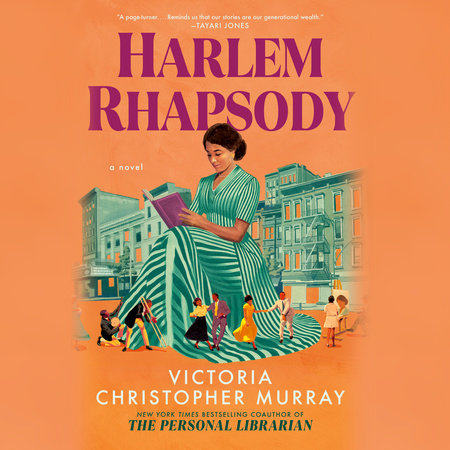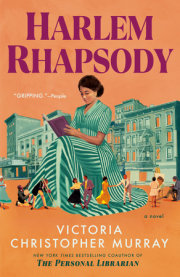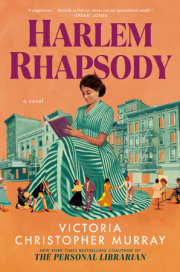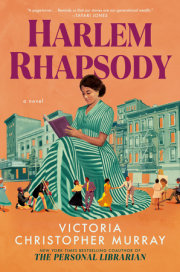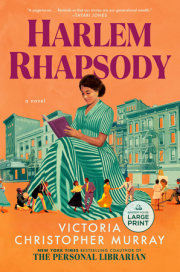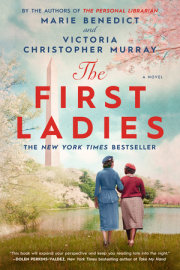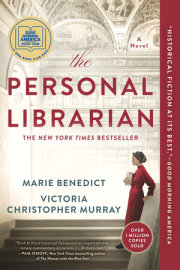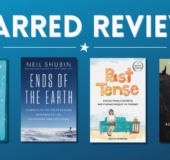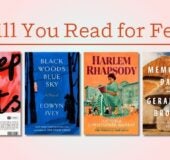Chapter 1
Sunday, October 19, 1919
I thrust open the taxicab's door, and the moment my T-strap heels hit the pavement, a cacophony of city sounds welcomes me. The music enraptures me first.
I can't sleep at night . . . I can't eat a bite . . .
From a Victrola perched near an opened window, the lyrics from "Harlem Blues" float down, and then Mamie Smith's contralto drifts into the breeze. The joyous sound of two giggling girls skipping past draws me from the song.
"You're just bumping your gums," a man shouts, and uproarious laughter rises from the circle of men dawdling in front of the barbershop a few doors away.
I stand, absorbing it all: the patter of a thousand footsteps of men and ladies and kiddies rushing past . . . motorcars chugging and clanking and clicking behind me . . . honking horns squealing into the air.
'Cause the man I love . . . he don't treat me right . . .
It isn't a cacophony, it's a rhapsody, and my heart races to match its beat.
"Jessie!"
I face my mother and am surprised to see her brown eyes framed by a frown. She points to my valise on the sidewalk next to hers. "Are you expecting me to carry both?"
"Oh." I laugh, and a smile fills her face. "Apologies, Maman. But we're in New York." I twirl in front of her, and my wrap coat billows at my ankles.
"We are." She gives me a short nod. "You're behaving as if you've never lived in a big city."
"You can't compare Philadelphia and Washington, DC, to this. New York is everything. It's music and theater and . . . come on, Maman." Carrying my valise, I rush toward the sienna-brick brownstone.
At the first step, I glance over my shoulder. My mother stands in the same spot. In her pale gold overcoat and matching cloche, she is as fashionable as any New Yorker. But her eyes are as wide as mine as she soaks in the city's vivacity.
My heart swells for the woman who didn't birth me but who, for the last twenty-five years, has nurtured me with love. "You were born from my heart," she's told me since I was twelve.
Over the city's music, I call out, "Allez, Maman!" in the same tone she'd used with me moments before.
At the front door, my hand trembles with excitement as I try to steady the key. We step into the vestibule and then through another door before we enter the hallway and I move to the only door on the first floor. But before I insert the key, the door swings open.
"Will!"
"Welcome to New York!"
I study the man I'd first contacted when I was a student at Cornell University, some sixteen years ago. His mustache has been trimmed since I last saw him in August. And there is a bit more silver blending with the jet-black hair of his beard. As always, he's dressed impeccably in one of his brown three-piece, wide-lapel suits. Tonight, though, he wears a more formal bow tie rather than the neckties I know he prefers.
The twinkle in his eyes and his wide smile draw me closer. However, just as I reach for him, I remember. My mother. How had I forgotten her so quickly?
That is the effect of W. E. B. Du Bois. His mere presence emits a magnetic force that is difficult to deny or resist.
This is a reminder that now, living in New York, I must be measured in my actions. This will be different from seeing Will on his occasional stopovers in Washington, DC.
I shift so my mother can enter our new apartment, but she doesn't take a single step. She expects an introduction. "Maman, allow me to present Dr. William Du Bois."
"Mrs. Fauset, it is my absolute pleasure to finally make your acquaintance." He takes her valise.
My mother's smile has vanished. She steps over the threshold and greets Will with a curt "Good afternoon."
My mother strolls around the parlor, taking in the regal Victorian-style room decorated in crimson and gold, and runs her hands over the oak edge of the sofa, then the matching damask-upholstered wingback chairs.
"This is a nice apartment." I hope my mother agrees. I turn to the bay windows facing Seventh Avenue. "But look at this, Maman. This . . . will be my favorite place."
The windows jut out of the brownstone like a pair of owl's eyes keeping watch over the neighborhood.
Will says, "This is the largest apartment, the only one in the building that hasn't been split."
"What do you mean?" My eyes are once again on my mother as she rounds the room.
"With so many people flocking to New York from the South, landlords are reconstructing the spaces, dividing apartments in half, then doubling the rent," Will explains. "I know the owner of this brownstone, so I secured one of the best furnished spaces in Harlem for you."
My mother's steps are silent against the Oriental area rug as she saunters toward the back.
"Some of the gals from the office prepared the apartment. Then, of course, Helen," he says, referring to my sister. "We wanted to make certain you had everything you'd need until your belongings arrive."
My mother pauses where the parlor spills into the kitchen. Even with the icebox, stove, and sink, there is space for a hutch and a small dining table.
"Would you like me to show you the two bedrooms and the water closet, Mrs. Fauset?"
"No." She waves her hand. "I'm certain those rooms are sufficient."
I nod, Will nods, and my mother says nothing as she lowers herself onto the sofa. She sits-back straight, shoulders squared, her coat still buttoned-as if she hasn't determined whether she'll stay.
After a moment, I sit in one chair and Will in the other. Maman speaks first: "Dr. Du Bois, thank you for not only finding us this home, but for securing this job with The Crisis magazine for my daughter."
"No thanks is necessary. I wanted to make certain you would be comfortable, and Jessie . . . I mean, Miss Fauset has earned this position as the literary editor. I expect that section of The Crisis to thrive under her leadership."
"I agree; my daughter will be a credit to your magazine. Jessie has always been a writer, and has been educated well. She's not only a Phi Beta Kappa graduate, but she's proficient in several languages. And in her teaching career, she has already-"
"Maman," I interrupt, dismayed. My glance shifts between her and Will. "I'm certain Dr. Du Bois doesn't desire a recapitulation of my credentials."
"Yes, I was quite impressed with your daughter when I interviewed her for this position."
"Is that when you first became"-she pauses-"impressed?" Another pause. "With my daughter?"
If Will hears my mother's derision, he gives no indication. "I was very impressed. Beyond Miss Fauset's writings is her understanding that literature is a venue that must be utilized to display the best of the Negro race."
"On that, we can agree, Dr. Du Bois. Literature can be useful in this fight for equality. That's what I tell my daughter. She can change this world with words."
My mother's sentiments are no surprise to Will. I've shared her background, especially the two factors of most interest to me when my widower father, the Reverend Redmon Fauset, introduced Bella Huff as the woman he was going to marry. Bella, herself a widow, was Jewish and a staunch integrationist.
At twelve, I understood Judaism, but had no understanding of an "integrationist." I came to understand the term more by my stepmother's actions than by explanation. She supported the complete social integration of the races, something she spoke about often in my father's church, after she converted to Christianity, and at local NAACP meetings. But she didn't just speak her belief, she lived it. Bella had married a Negro-twice-and in those unions, she'd birthed six mixed-race children.
Will's voice draws me back. "I'm excited for Miss Fauset to be with us at this propitious time, Mrs. Fauset. The war is over, the world is changing, and we not only need to be part of that change, but must also facilitate that change. This is the time for the new Negro, and literature must play its role. At its best, literature is a useful form of propaganda."
My mother tilts her head. "That's an interesting concept."
Will says, "I am not interested in any kind of literature that isn't propaganda. Any art by Negroes must serve one purpose alone-to uplift the race and present Negroes in a way white folks have never seen. Art must serve to change more than minds, art must change hearts. Through literature, stories can be shared that recognize the contributions colored folks have made in just fifty years, post-emancipation. The written word can be more powerful than any speech I can deliver."
"I hear your passion, Dr. Du Bois, and I am inspired by your words."
I release my apprehension about Maman and Will finally meeting. Here, the two can agree. William Du Bois and Bella Fauset possess the same fervor for equality.
But then my mother abruptly says, "How old are you, Dr. Du Bois?"
"Maman!"
Will sits up straighter. "I am fifty-one," he proclaims, with a bit of grandiosity. I do not fault him for this. In his fifty-one years, there are few-colored or white-who can match the accomplishments of W. E. B. Du Bois, the professor and civil rights leader. From his two college degrees, to being the first Negro to receive a PhD from Harvard, along with all of his teaching and writing and speaking, his achievements precede him.
My mother knows this. Yet when he tells her his age, she hums and smirks, and I am at once embarrassed. She says, "It seems you are closer to my age than my daughter's."
Inside I pray to the almighty God above to open the floorboards below and swallow me whole. But it appears I am the only one perturbed.
"What you say may be true, Mrs. Fauset." He responds with an innocence that makes me question how he'd missed the edge in my mother's tone. "That is one thing I admire about your daughter. Her youthful exuberance."
"At thirty-seven, I'm hardly youthful." I laugh through my jitters.
"Perhaps then I'm the exuberant one. Mrs. Fauset, the poetry, essays, and even the book reviews your daughter has contributed to The Crisis are some of the best writing we've published. She will bring that excellence to the magazine."
My mother's smile returns. "You have chosen well, Dr. Du Bois. I understand why you are impressed with my daughter."
Again, my mother and Will have reached a respite . . . until: "Dr. Du Bois, I'm certain you're a busy man."
Will nods. "My schedule is quite full."
"Which is why I'm surprised you're here. You knew my daughter had the keys. I understand you'd personally delivered them to her weeks ago. Although, I cannot conjure up a single reason as to why you'd make a trip all the way to Washington, DC, just to give my daughter . . . the keys."
Heat warms my cheeks, and I make a mental note to give Arthur quite a talking-to. I am certain it is my younger brother who shared those details with our mother, since he was visiting when Will came to Washington.
"Yes." Will's eyes are wide. My mother has finally surprised him, and he scrambles for an explanation. "I wanted to make certain, in case I was not available, you would have access to the apartment, as I knew Helen and her husband would be away. However, when my schedule opened up, I thought it best to greet you myself."
My mother asks, "Do you live in Harlem, Dr. Du Bois?"
"Yes. I love it here. This part of New York isn't just a neighborhood. Harlem is a character, with its own personality. I plan to make this place my permanent home."
"Do you and your wife live close by?"
I wince. Will stiffens. "Yes. About a mile away."
"So close," she says, then adds, "It won't take you very long to get home." My mother stands, and Will does the same. "I'm going to look at the bedrooms while Jessie shows you out, Dr. Du Bois."
When she disappears into the hallway, I am both astonished and mortified.
I whisper to Will, "I'm so sorry."
His volume matches mine. "She doesn't like me."
"That's not true," I deny and lie. "She doesn't know you."
He chuckles. "It seems your brother has shared some stories about us."
"No." I shake my head emphatically. "Arthur would never discuss such things, and besides, what does he know? Anything he's heard about us is merely rumor."
"Ma chérie," Will begins, making me smile, "every rumor about us is true." He reaches for my hand, and although I should pull away, I don't. Weeks have passed since I've felt his touch, and I want to slow time.
"I'm so glad you're finally here, Jess." His voice remains low. "This is quite an endeavor. I've built The Crisis into the most important periodical for Negroes, and now, with you, it will become the preeminent magazine for Negro writers. Everyone with a poem or a story will want their name inside these pages."
"I'm looking forward to it all."
His voice is thick when he adds, "I'm looking forward to the magazine . . . and much more."
I want to draw closer, but we aren't at the Whitelaw Hotel in Washington, DC, and my mother is not even a stone's throw away.
When I hear my mother's footsteps, Will and I move apart. He takes an envelope from his jacket. "Here is the address and directions to the office. Everyone on staff is looking forward to meeting you."
There is so much more that I want to say and know and ask. But I feel the heat of my mother's stare, so I only thank Will before he exits.
If Maman hadn't been standing so close, I would have rushed to the window to watch him. Instead, I paste on a smile and face her.
She says, "So, that is your Dr. Du Bois."
Her statement is designed to set a snare, so I press my lips together and say nothing.
"He's not at all what I expected."
I am unable to resist. "What do you mean, Maman?"
"He has the reputation of being such an important and grand man." A beat. "And yet, he's rather short."
Copyright © 2025 by Victoria Christopher Murray. All rights reserved. No part of this excerpt may be reproduced or reprinted without permission in writing from the publisher.

